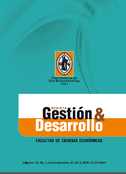La Revista Gestión & Desarrollo proporciona acceso abierto e inmediato a su contenido, basada en el principio de ofrecer al público un acceso libre a las investigaciones para ayuda a un mayor intercambio global de conocimiento.
Excepto que se establezca de otra forma, el contenido de esta revista cuenta con una licencia Creative Commons Attribution-NonCommercial-NoDerivatives 4.0 International (CC BY-NC-ND 4.0) que puede consultar en http://creativecommons.org/licenses/by-nc-nd/4.0/
- Attribution — You must give appropriate credit, provide a link to the license, and indicate if changes were made. You may do so in any reasonable manner, but not in any way that suggests the licensor endorses you or your use.
- NonCommercial — You may not use the material for commercial purposes.
- NoDerivatives — If you remix, transform, or build upon the material, you may not distribute the modified material.
- No additional restrictions — You may not apply legal terms or technological measures that legally restrict others from doing anything the license permits.
Abstract
Codes of ethics are a set of rules and parameters that establish the behavior of individuals in a particular social group. The society has trusted in the conduct of professional accountants under the commitment to fully implement the principles of the code of ethics of their profession in the public interest and in a high quality work. IFAC (International Federation of Accountants) is an organization representing worldwide professional accountants and proposes to standardize the international code of ethics and international conduct to guide the quality of professional practice. In Colombia, the Central Board of Accountants normalizes the code of ethics of professional accountant in the Law 43 of 1990. The process of convergence to international accounting standards (Law 1314, 2009) proposes the adoption of accounting standards IAS and IFRS and auditing standards ISAs. In the internationalization of accounting it is cleared that the standards of the code of ethics and conduct of the IFAC as a global standard for presentation of financial information were taken into account. A comparative is shown between the rules to deduce potential advantages and disadvantages in application.
References
– Congreso de la República de Colombia. (1990). Ley 43 de 1990. Bogotá, D.E.: Diario Oficial.
– Comité de Ética de la Federación Internacional de Contadores. (2005). Código de Ética para Contadores Profesionales. New York
– CORTÉS, A., (1987). “Auditoría tributaria”. En: Revista Contaduría No. 10, pp. 37, 41.
– FLÓREZ , E. (2005). Elementos de ética, filosofía, política y derecho: los vínculos entre la filosofía, el derecho, la ética y la política examinados a la luz del pensamiento de los grandes filósofos. Caracas: Colección Minerva.
– POSEY, D. A., y DUTFIELD, G. (1999). Más allá de la propiedad intelectual. Uruguay: Editorial Nordan.
– PRADO Galán, J. (1999). Ética, profesión y medios: la apuesta por la libertad en el éxtasis de la comunicación. México: Universidad Iberoamericana.
– ROSENTAL, M, y LUDIN, P. (1965). Diccionario filosófico. Montevideo: Ediciones Pueblos Unidos.
– ROTMAN, E. (1974). Los fraudes al comercio y la industria. Buenos Aires: Abeledo-Perrot.
– SALCEDO Megales, D. (1999). Los Valores en la Práctica del Trabajo Social. España: Narcea Ediciones.
– TÉLLEZ, B. (2008). El dictamen en la contaduría pública. México: Internacional Thomson Editores.
– VARGAS, C. (2006). Balances falsos o incompletos. Buenos Aires: Editorial Dunken.
– VÉLEZ, L. y SARMIENTO, J. (2003). Ética Médica: interrogantes acerca de la medicina, la vida y la muerte. Medellín: Corporación para Investigaciones Biológicas.










